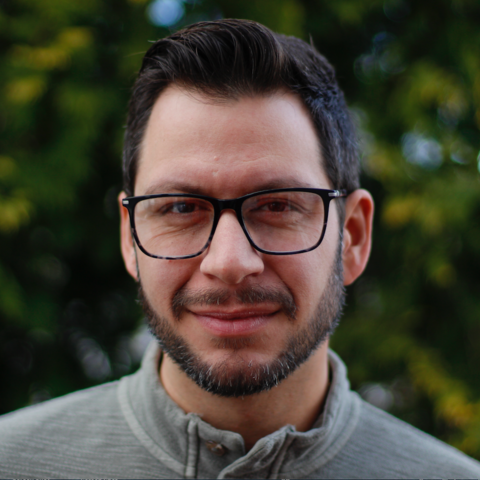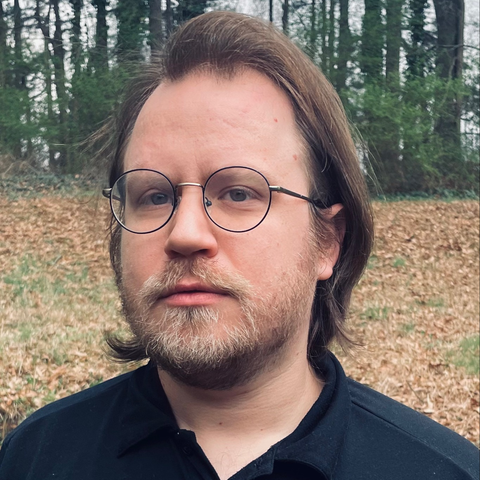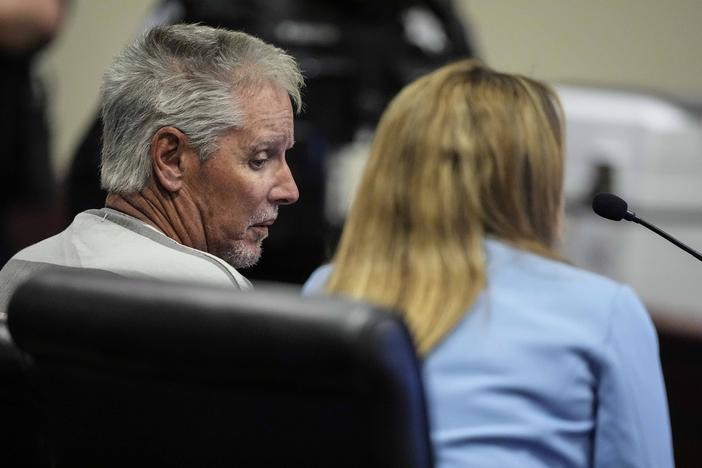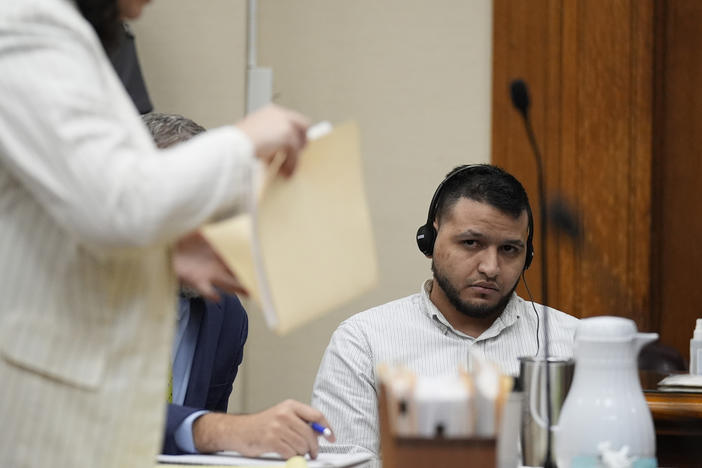
Section Branding
Header Content
Georgia Today: New congressional maps closer; Deadly coal-fired power; Imam murder conviction podcast
Primary Content
On the Tuesday, Dec. 5 edition of Georgia Today: Georgia legislators move one step closer to approving new congressional maps; two Georgia coal-fired power plants are ranked among the deadliest in the nation; and a new podcast takes a fresh look at the murder conviction of an Atlanta imam.

Peter Biello: Welcome to the Georgia Today podcast from GPB News. Today is Tuesday, Dec. 5. I'm Peter Biello. On today's episode, Georgia legislators move one step closer to approving new congressional maps to Georgia. Coal-fired power plants are ranked among the deadliest in the nation. And a new podcast takes a fresh look at the murder conviction of an Atlanta imam. These stories and more are coming up on this edition of Georgia Today.
Story 1:
Peter Biello: Georgia's special legislative session on redistricting is expected to wrap up tomorrow. GPB's Donna Lowry reports, a federal judge ruled the current districts violate federal law by diluting Black voting power.
Donna Lowry: In presenting the proposed House district maps, Senate redistricting chair Shelly Nichols of Gainesville says her maps comply with the federal court order that led to the special session.
Shelly Nichols: This plan increases the number of majority-Black districts from the prior plan based on the numbers, and it adds the required majority-Black district in metro Atlanta as required by Judge Jones.
Donna Lowry: In the end, the House and Senate approved the Republican-drawn maps for each of their chambers, preserving their current majority. The bills now go to the governor to sign. The congressional map is still in play. The Senate approved it today. The House is expected to vote on it tomorrow. For GPB News, I'm Donna Lowry at the state Capitol.

Story 2:
Peter Biello: Voters in dozens of municipalities across the state are heading to the polls today to decide runoff elections. Among other races, voters will decide a citywide school board race in Atlanta, a city council race in Valdosta and a mayor's race in Brookhaven. Polls will remain open until 7:00 this evening.
Story 3:
Peter Biello: A new nationwide study of smokestack emissions from coal-fired power plants ranks two Georgia facilities among the most deadly in the nation. GPB's Grant Blankenship explains.
Grant Blankenship: The multi-year university study, which includes Georgia Tech, paired pollution data from 480 U.S. coal fired power plants with atmospheric models, and compared that to deaths of elderly Medicare recipients over 20 years. It found these particles from coal were responsible for close to half a million deaths and twice as deadly as the same from other sources, like cars. Georgia Power's Plant Bowen was the second most deadly power plant in the study. Plant Scherer was in the top 25. Now, Georgia Power says they want to keep both Bowen and Scherer open about a decade longer than planned to power the state's EV industry. That points up an irony, says Francesca Dominici of Harvard's T.H. Chan School of Public Health, a study coauthor.
Francesca Dominici: We don't really know how this transition to electric car is burdening the power grid. And so they think they're doing the right thing, but actually they're doing probably even worse.
Grant Blankenship: The good news? Smokestack scrubbers mean today Georgia's coal plants likely lead to only tens of deaths annually rather than thousands, as they did over a decade ago. The study, "Mortality Risk from United States Coal Electricity Generation,:" appears in the journal Science. For GPB News, I'm Grant Blankenship in Macon.
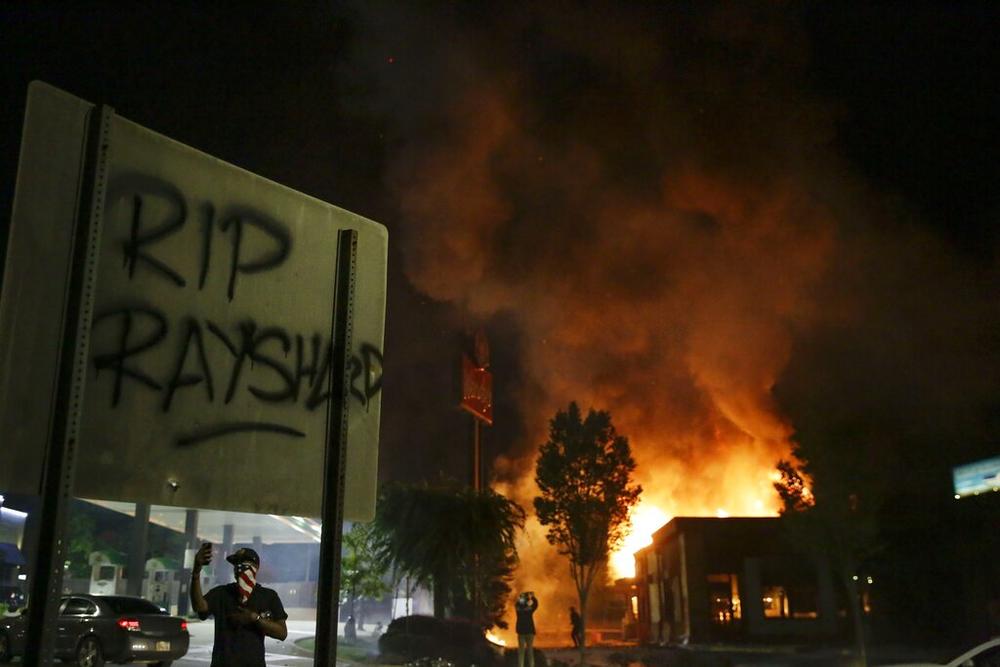
Story 4:
Peter Biello: Two of three people charged with arson in the burning of an Atlanta Wendy's restaurant in 2020 have pleaded guilty after reaching a deal with prosecutors. The arson took place where a police officer fatally shot Rayshard Brooks in a summer of racial tensions over the deaths of George Floyd, Ahmaud Arbery and others. Chisholm Kingston and Natalie White pleaded guilty to several charges and were sentenced to five years of probation, among other penalties. A third defendant's case was still pending.
Story 5:
Peter Biello: The Air Force says a Kennesaw man was among those killed during a training mission off the coast of Japan last week. 25-year-old Staff Sergeant Jake Turnage was a flight engineer. He was one of eight service members who died when their Osprey crashed. The U.S.-made Osprey is a hybrid aircraft that takes off and lands like a helicopter, but can rotate its propellers forward and cruise like an airplane. Ospreys have had a number of crashes where they are used at U.S. and Japanese military bases, and the latest accident has rekindled safety concerns. Japan has suspended all flights of its own fleet of 14 Ospreys. Japanese officials say they have asked the U.S. military to resume Osprey flights only after ensuring their safety. The Air Force Special Operations Command says it's focused on recovering the bodies of those lost and aircraft debris.

Story 6:
Peter Biello: The Georgia Ports Authority will spend $127 million building a new inland terminal for moving cargo by train between Savannah's busy seaport and Gainesville, northeast of Atlanta. The Port Authority's governing board voted today to approve the funding, which includes a nearly $47 million federal grant. The new terminal, known as the Blue Ridge Connector, will link Northeast Georgia to the port of Savannah roughly 250 miles away, giving shippers an alternative to moving freight by truck through Atlanta. It'll be the third inland terminal operated by the Port Authority, which also has them near the Tennessee line, South Chattanooga and in rural Bainbridge in Southwest Georgia. The new facility is expected to open in 2026.
Story 7:
Peter Biello: Massive growth at the Port of Savannah has led to a tidal wave of new warehouses in Southeast Georgia. And along with those new warehouses could come noise and traffic. And as GPB's Orlando Montoya reports, some residents are pushing back.
Orlando Montoya: The latest warehouse news came last week: A Texas company plans to build an $80 million plastics shipping hub the size of 15 football fields in an area just west of Savannah once considered rural. Laura Mackie lives on a nearby farm her family has owned more than 90 years. She says local officials recently and quickly have changed the area around her from residential/agricultural to industrial.
Laura Mackie: They just keep rezoning and rezoning, when we don't have the infrastructure to take care of it. So it's just another Atlanta. It's absolutely another Atlanta coming.
Orlando Montoya: Local and state officials tout jobs, but residents fearing near constant noise and traffic, have banded together under the name "Don't Box Us In." For GPB news, I'm Orlando Montoya.
Story 8:
Peter Biello: The average rate for car insurance in Georgia has jumped 22% in the last year. A new report from MarketWatch says Georgia rates are going up faster than rates in 30 other states, in part because of rising Georgia accident rates and auto thefts. The report says the average full coverage premium in Georgia is a little more than $1,600 per year.

Story 9:
Peter Biello: In March of 2000, two sheriff's deputies were shot outside a mosque in Atlanta. One of them later died. And police arrested Iman Jamil Al-Amin, the leader of that mosque, and he was later convicted of murder. But what seems like an open-and-shut case to prosecutors is actually a more complicated story. And for more on why we turn to investigative reporter Mosi Secret. His new podcast explores the lesser-known reasons why Imam Jamil was implicated. The podcast, which is out today, it's called Radical. And he's with me now. Welcome to the program.
Mosi Secret: Hi. Thank you. It's great to be here.
Peter Biello: Before he was known as Imam Jamil, he was H. Rap Brown, who in the 1960s and '70s was a Black Power activist. This podcast spends a lot of time focusing on why the FBI deemed him radical. What was he doing at the time that attracted the attention of the FBI?
Mosi Secret: Imam Jamil Al-Amin, formerly known as H. Rap Brown, as you said, was a part of communities that were essentially oppressed at that time, suffering from a lot of police violence and, and other types of — other forms of oppression. And he had a really bold response to that, which was to advocate violent armed self-defense of those communities. And that, to no surprise, upset law enforcement at all levels.
Peter Biello: And how did those statements about violence in the past affect him later when he was arrested for the murder of that one deputy and the injuring of the other?
Mosi Secret: Well, he had this reputation throughout his life as being an advocate for violent self-defense. And we know because of that, there was a long trail of surveillance throughout his life, through the many stages of his life. And some of that surveillance was involved in his apprehension for the — for the shooting of the two deputies.
Peter Biello: Mm hmm. The evidence against him seemed damning to prosecutors, including Robert McBurney, who is now a judge and involved in the 2020 election interference case against former President Trump. Why did McBurney and others think this case was so solid?
Mosi Secret: Well, they had what in the court of law tends to be very strong evidence. Primarily, there was an eyewitness — or there was testimony from someone who was there, a victim who happened to be a police officer. That's a very hard burden for any defense lawyer to overcome. There was also evidence in the case presented of ballistics that matched the bullet from Jamil Al-Amin's gun to those found in the bodies of the deputies and on the scene of the crime. So these are very difficult things for a jury to cast aside.
Peter Biello: But there are those who defend him, including former Atlanta Mayor Andrew Young. What did Andrew Young have to say in his defense?
Mosi Secret: Well, just as there was a lot of evidence presented against Imam Jamil Al-Amin, there was a lot of evidence that undercut the prosecution's case. There has been a confession that's been floating around for decades at this point from someone who says that he was there. The identification of Imam Jamil by one of the victim police officers or sheriff's deputies was — had its own problems. And there were seven or eight different points that, cumulatively, really called into question the veracity of the findings. So Mayor Ambassador Young, as a — you know, I won't say colleague, but as a comrade in the movement, wanted to call attention to these problems with the case.
Peter Biello: Can I ask you to tell us a little bit about your — your personal investment in this story?
Mosi Secret: In a weird way, this story kind of chose me. Imam Jamil Al-Amin had a community in Atlanta where I'm from. Many of the people in the community were converts to Islam. My family converted to Islam and was a part of this community for a short while when I was a kid. So his case is something that I knew about. The people who were around him are people who my family knows. And so there is that connection. And then if we extend later into my life, I've done investigations into, in one case, what turned out to be a wrongful conviction. And I've done a lot of writing and work on the criminal justice system. So there was a way that the lens that I bring to this story felt like a natural one. And in some ways it was a story that was waiting to be retold by me.
Peter Biello: You weren't able to talk to him for this podcast, but you did reach out.
Mosi Secret: Yeah, definitely. We wrote him a letter and we — and we tried to contact him through some of his representatives but did not hear back.
Peter Biello: Imam Jamil is currently incarcerated in federal prison. What can you tell us about how he's doing there?
Mosi Secret: Imam Jamil is 80 years old, I believe. He is in declining health. He's had a number of serious health issues, but he's — he still seems to be going strong. He has supporters who are in touch with him pretty regularly and he's making it.
Peter Biello: That's Mosi Secret. He's the host of the new podcast Radical; The first two episodes of which are out today. And there are many more to come. You can find a link to it at gpb.org/news. Mosi, thanks very much.
Mosi Secret: Thanks for having me.
Peter Biello: And that is it for this edition of Georgia Today. If you want to learn more about any of these stories, visit GPB.org/news. And remember to subscribe to this podcast. We'll be back in your podcast feed tomorrow afternoon. If you've got feedback, we'd love to hear from you. Send us an email. The address is GeorgiaToday@GPB.org. I'm Peter Biello. Thank you again for listening. We'll see you tomorrow.
---
For more on these stories and more, go to GPB.org/news
